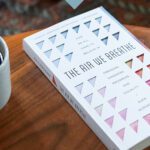Part of our annual My Year In… series
Here are my 10 favourite books from this year. Not many fun, fluffy, pastoral, or practical books made it to the top of my appreciation pile this year. The books that did were often about ideas. That wasn’t a plan, but rather just the way it turned out.
1. Changed Into His Likeness (Millar)
The argument of this book feels intuitively wrong when you first hear it, but once you’ve read it you find the case so compelling you have to admit Millar was right all along. The argument is: in the Old Testament no one changes, it’s only with the coming of the Spirit in the New Testament that people start changing. Isn’t that a provocative premise? The strength of the book is also its weakness: Millar’s argument is careful, measured, and comprehensive. Extremely comprehensive. Often when I realised a chapter had convinced me, I found there was still two-thirds of it to go. But that’s the strength too: no stone is left unturned and there’s no sneaky omissions either. It’s God’s Spirit, at work through his Word, who changes us. You may have already thought that’s how it worked, but Changed Into His Likeness will make it so you’ll never doubt it again.
2. Doctrine of Scripture: An Introduction (Thompson)
This book is, in my opinion, a great example of theological method. Thompson starts with Jesus, stays close to the Bible, and never strays far from either as he explains the doctrine of Scripture. Yes, it’s called an introduction and it certainly is that—it would be intellectually stretching but certainly within the grasp of the inquiring beginner—yet it’s still useful and stimulating for the non-beginner too. Thompson navigates some tricky terrain in a way that never feels needlessly complex nor frustratingly simplistic. A worthwhile primer for the newcomer and a helpful refresher for the well-taught.
Thompson navigates some tricky terrain in a way that never feels needlessly complex nor frustratingly simplistic.
3. Friends (Dunbar)
“Dunbar’s Number” is a highly interesting phenomenon that essentially says that the numbers of friends a human can maintain is roughly 150. This insight was first discovered by studying the brain sizes of various primates and mammals before being applied to humans and has been established multiple times across multiple fields of study. Robin Dunbar is the Dunbar behind Dunbar’s Number. And this book is filled to the brim with fascinating research into various aspects of friendship, from the health effects of loneliness (it’s the emotional equivalent of a physical assault); the time it takes to develop a friendship (around 100 hours); to the importance of discerning what someone else is thinking (the more you can do this the more relationships you can maintain). But while the book overflows with scientific studies, it also feels superficial and almost hollow. There is very little to answer the “so what?” and the “therefore”. Friends focuses on providing dots, lots of dots, but it doesn’t seem particularly interested in joining them. For some readers this will be just fine and they’ll be happy to join things up themselves, whereas for others this join-lessness will leave them deeply frustrated.
4. The Life of Faith (Peter Jensen)
Peter Jensen has a way of explaining theological concepts that seems effortlessly clear and uniquely constructive. He doesn’t just repeat and outline a historical, theological, position. He’s doing theology. It feels like we’re thinking together about God and his Word—encountering roadblocks, pondering possible ways forward, marshalling Bible passages, and drawing conclusions. At the same time The Life of Faith has some odd omissions. For example, some key terms are assumed or listed but never explained. This makes it feel like the book isn’t for the absolute beginner, but it also seems too introductory for the intermediate. Its intrigue is hearing familiar concepts explained and connected in sometimes-unfamiliar ways by a clearly-masterful intellect.
5. The Coming of the Holy Spirit (Phillip Jensen)
Most of, if not all, the books I’ve read on the Spirit have focused on Paul’s references to the Spirit’s person and work, or one of the many controversial Spirit-related topics. A book that gives the foundational place to what Jesus says about the Spirit is a book that I have long-looked for. If a book like that existed before this one, I never came across it. Jensen’s book may be one of the least-overt polemical books I’ve ever read, which is quite a feat for a book about such a controversial person and ministry as that of the Spirit. This following-the-Bible, non-polemical flavour made the book, at times, feel slightly repetitive and obvious. But upon reflection this is a feature rather than a bug because the book is focusing not on the controversies but on what the Bible actually says. This is a valuable read for any interested reader.
6. The Rise and Triumph of the Modern Self (Trueman)
This was the book everyone loved a couple of years ago and I finally got around to reading it this year. And it was just as interesting as everyone said it would be. The argument is relatively simple: the individual has been psychologised, psychology is then sexualised, and finally sex is politicised. The book’s not hard, in that sense, it’s just long. And detailed. Trueman himself admits that this kind of intellectual history isn’t the only lens one could use to explain how we as a society have gotten to the point where someone can say, “I am a man trapped in a woman’s body” and everyone knows what they mean. But this shouldn’t undermine the brilliance of what Trueman has done for us here. He’s highlighted some of the main threads in the tapestry over the last 300 years, and they’re threads that I didn’t have the capacity to even notice, let alone trace their cumulative significance.
The argument is relatively simple: the individual has been psychologised, psychology is then sexualised, and finally sex is politicised.
7. Biblical Critical Theory (Watkin)
This book deserves all the praise it has received. It really is an intellectual tour-de-force. But it also isn’t particularly difficult to read either. Watkins discusses a vast array of philosophical and intellectual concepts. And his confidence in the scriptures shines throughout as he, humbly, continually shows at every point: the Bible does this better. Watkins’ grasp of the key issues, streams of thought, and where various philosophical conclusions both come from and lead is stunning. I must admit that I thought the book was strongest in the first half, while the second half feels like it lost some of its sparkle. Having said that, the whole book is still magnificent, and I’ll be definitely re-reading it and dipping back into chapters for years to come.
8. Jesus and the Forces of Death (Thiessen)
Ritual impurity was a big deal to the ancient Israelites, to a degree that can be hard for us to fully appreciate. But this book helps to open up that facet of the ancient world and its impact in and through Jesus’ ministry. Jesus and the Forces of Death sets out to argue against what, apparently, is a common position: that Jesus opposed and was dismissive of the Old Testament purity laws. Theissen argues the opposite: that Jesus respected and upheld the Old Testament law. In my circles, I’ve never met or read anyone who argued Jesus was dismissive of the Law, which made the book a bit odd to read. But the content definitely helped to deepen my understanding and appreciation even more of what Jesus was doing in his life and ministry.
9. The Essential Mary Parker Follett (Heon et al.)
For a lot of people, Peter Drucker is the modern leadership guru. Mary Parker Follett was Peter Drucker’s leadership guru. For anyone interested in being a student of modern leadership thinking and practices, Mary Parker Follett is one of the most-overlooked, possibly almost-forgotten, thinkers. This book is an easy sampler of her thought, broken up into bite-sized chunks and quotes to get you started and to whet the appetite to launch into some of her longer, harder-to-find works.
10. Upstream (Heath)
While not my favourite Heath-brothers-written book (that prize easily belongs to “Switch”, followed very closely by “Decisive”) there’s still plenty in here worth reading and thinking over. What if problems weren’t just things you attempted to solve after they’d happened? What if we tried to solve problems before they became problems? This type of thinking will certainly resonate with any thoughtful leader, and this book will provide plenty of fodder. From thinking through what holds back this kind of approach to how to begin thinking this way and taking steps in this direction, Upstream has enough in it to make it worth your time. But there are other, better Heath-brothers books to start with if you’re early in your leadership-book journey.















